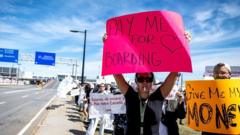In a significant development for the aviation industry, Air Canada flight attendants recently initiated a strike demanding recognition for unpaid work, leading to major disruptions during peak travel season. Their rallying cry, "Unpaid work won't fly," reflects a broader issue that has persisted in North America: cabin crew often aren't compensated for ground work—tasks performed prior to takeoff.
Unlike some European carriers, which pay flight attendants a monthly salary that encompasses all duties, many North American airlines including Air Canada, Air Transat, and WestJet have traditionally limited compensation to in-flight hours. The strike was not only supported by the passengers, but also sparked nationwide awareness, as polls indicated public sympathy for the striking workers.
Following the strike, both the Canadian Union for Public Employees (Cupe) and Air Canada struck a tentative agreement, which reportedly includes pay increases over the coming years and introduces compensation for ground work, notably for boarding and cabin checks. This development has been hailed as historic, marking a potential shift in labor standards for cabin crews across North America.
However, as details of the agreement emerge, many flight attendants express dissatisfaction. Their acceptance of the deal remains uncertain. Observers note that the issue of unpaid work is not exclusive to Air Canada; it also affects employees at other Canadian airlines and many in the United States, such as United Airlines.
Industry experts believe that establishing ground pay for Air Canada's cabin crew may initiate a domino effect, potentially affecting labor practices across major North American airlines. John Gradek, an aviation management expert, remarked that this could lead to widespread changes, suggesting that ground pay could become the new standard in the industry.
The conversations surrounding pay practices have gained traction since the onset of the COVID-19 pandemic, which complicated fire ground operations for cabin crew. This added pressure, coupled with public support for an end to unpaid labor practices, has intensified efforts to improve compensation structures.
With Air Canada making strides towards fairer wages, it has been noted that competitors like Air Transat and WestJet may follow suit as they face upcoming contract negotiations. This development has been interpreted as a broader turning point for labor rights in Canada, particularly given the union's strong stance against government interventions aimed at forcing them back to work.
As the industry navigates these changes, the implications for flight attendants could extend well beyond Air Canada, potentially ushering in a new era of reforms in labor practices for airline workers across the globe.
Unlike some European carriers, which pay flight attendants a monthly salary that encompasses all duties, many North American airlines including Air Canada, Air Transat, and WestJet have traditionally limited compensation to in-flight hours. The strike was not only supported by the passengers, but also sparked nationwide awareness, as polls indicated public sympathy for the striking workers.
Following the strike, both the Canadian Union for Public Employees (Cupe) and Air Canada struck a tentative agreement, which reportedly includes pay increases over the coming years and introduces compensation for ground work, notably for boarding and cabin checks. This development has been hailed as historic, marking a potential shift in labor standards for cabin crews across North America.
However, as details of the agreement emerge, many flight attendants express dissatisfaction. Their acceptance of the deal remains uncertain. Observers note that the issue of unpaid work is not exclusive to Air Canada; it also affects employees at other Canadian airlines and many in the United States, such as United Airlines.
Industry experts believe that establishing ground pay for Air Canada's cabin crew may initiate a domino effect, potentially affecting labor practices across major North American airlines. John Gradek, an aviation management expert, remarked that this could lead to widespread changes, suggesting that ground pay could become the new standard in the industry.
The conversations surrounding pay practices have gained traction since the onset of the COVID-19 pandemic, which complicated fire ground operations for cabin crew. This added pressure, coupled with public support for an end to unpaid labor practices, has intensified efforts to improve compensation structures.
With Air Canada making strides towards fairer wages, it has been noted that competitors like Air Transat and WestJet may follow suit as they face upcoming contract negotiations. This development has been interpreted as a broader turning point for labor rights in Canada, particularly given the union's strong stance against government interventions aimed at forcing them back to work.
As the industry navigates these changes, the implications for flight attendants could extend well beyond Air Canada, potentially ushering in a new era of reforms in labor practices for airline workers across the globe.






















